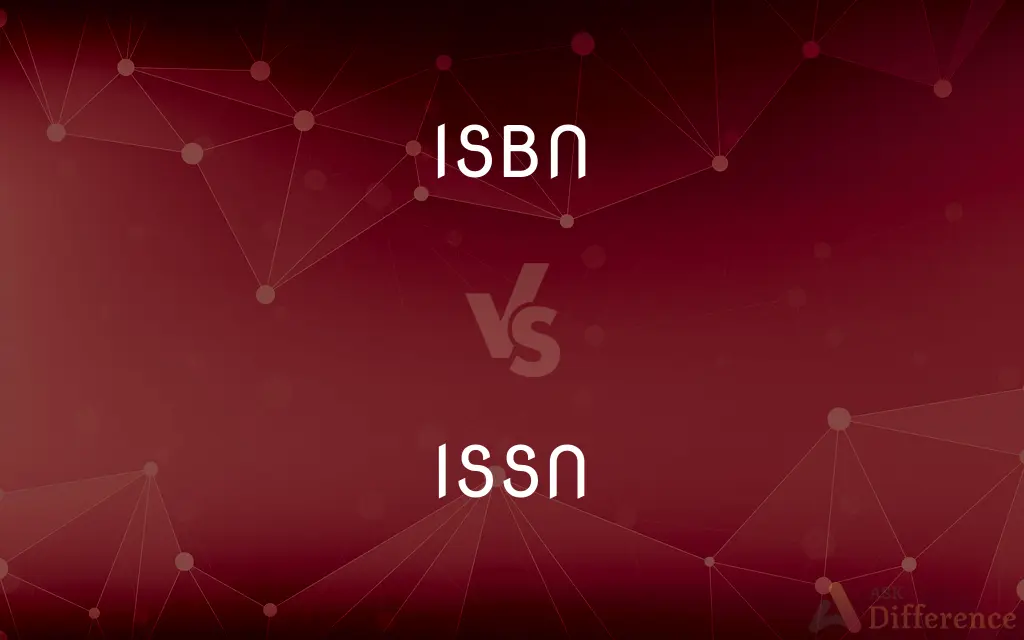ISBN vs. ISSN — What's the Difference?
By Tayyaba Rehman — Published on January 23, 2024
ISBN (International Standard Book Number) is a unique identifier for books, while ISSN (International Standard Serial Number) is used for identifying serial publications like journals.

Difference Between ISBN and ISSN
Table of Contents
ADVERTISEMENT
Key Differences
The ISBN is a numeric code assigned to books and book-like products published internationally. Each ISBN uniquely identifies a book's edition, publisher, and physical properties. ISSN, on the other hand, is an eight-digit code used to identify serially published works like magazines, journals, and newspapers.
ISBNs are specific to a book's edition, meaning different editions of the same book (like hardcover and paperback) have different ISBNs. ISSNs are assigned to the entire series of a periodical, regardless of individual issues or volumes.
The use of ISBNs facilitates the sale and distribution of books in the global marketplace. ISSNs are essential for the cataloging and systematic tracking of serial publications in libraries and databases.
An ISBN is typically 13 digits long (previously 10 digits before 2007), and its structure includes elements that indicate the book's country, publisher, and title. An ISSN is an 8-digit number, with no inherent meaning about the publication's content or origin.
ISBNs are managed by the International ISBN Agency, with local agencies in various countries responsible for assigning these numbers. The ISSN is assigned by the ISSN International Centre based in Paris or by national ISSN centers.
ADVERTISEMENT
Comparison Chart
Use
Identifying books and book-like products
Identifying serial publications
Code Length
13 digits (previously 10)
8 digits
Specificity
Unique to each edition and format of a book
Unique to a series, not individual issues
Function
Facilitates sales, distribution, cataloging
Aids in library cataloging, tracking
Managing Organization
International ISBN Agency
ISSN International Centre
Compare with Definitions
ISBN
ISBN is a unique identifier for books.
Each version of the textbook has its own ISBN.
ISSN
Facilitates organization and reference in libraries.
Librarians use the ISSN to track journal subscriptions.
ISBN
Helps in tracking and managing book sales.
The bookstore organizes its inventory by ISBN.
ISSN
Managed by the ISSN International Centre.
The publication received its ISSN from the national ISSN center.
ISBN
Essential for publishers and libraries.
Librarians use ISBNs to catalog new acquisitions.
ISSN
Used for magazines, academic journals, newspapers.
You can search for the magazine using its ISSN.
ISBN
ISBNs differ for paperback and hardcover editions.
The hardcover and paperback editions have different ISBNs.
ISSN
Unique to a series, not individual issues.
All issues of this journal share the same ISSN.
ISBN
Used globally for book identification.
You can find the book easily using its ISBN.
ISSN
ISSN is a code for serial publications.
The journal's ISSN is displayed on the back cover.
Common Curiosities
Are ISSNs transferable between publications?
No, an ISSN is unique to a specific serial publication and is not transferable.
Do different formats of the same book have separate ISBNs?
Yes, different formats (e.g., hardcover, paperback, eBook) each have a unique ISBN.
Is ISBN necessary for self-published books?
For wider distribution and sales tracking, self-published authors often get an ISBN.
Can an ISSN be assigned to online journals?
Yes, both print and electronic journals can have an ISSN.
How is an ISBN obtained for a book?
ISBNs are obtained through the national ISBN agency in the country where the publisher is located.
How long does it take to get an ISSN assigned?
The time frame can vary but usually takes a few weeks to a few months.
Is an ISBN required for all books?
While not legally required, ISBNs are essential for wider distribution and sale of a book.
How much does it cost to get an ISBN?
Costs can vary by country and number of ISBNs purchased.
Can the same ISSN be used for different language editions of a journal?
Generally, different language editions would have separate ISSNs.
Does a new edition of a book need a new ISBN?
Yes, a new edition of a book would typically require a new ISBN.
Are ISBNs and ISSNs used internationally?
Yes, both are internationally recognized systems.
Share Your Discovery

Previous Comparison
Maida vs. Wheat Flour
Next Comparison
Cupcakes vs. PastriesAuthor Spotlight
Written by
Tayyaba RehmanTayyaba Rehman is a distinguished writer, currently serving as a primary contributor to askdifference.com. As a researcher in semantics and etymology, Tayyaba's passion for the complexity of languages and their distinctions has found a perfect home on the platform. Tayyaba delves into the intricacies of language, distinguishing between commonly confused words and phrases, thereby providing clarity for readers worldwide.











































